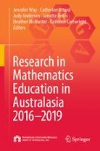- About MAA
- Membership
- MAA Publications
- Periodicals
- Blogs
- MAA Book Series
- MAA Press (an imprint of the AMS)
- MAA Notes
- MAA Reviews
- Mathematical Communication
- Information for Libraries
- Author Resources
- Advertise with MAA
- Meetings
- Competitions
- Programs
- Communities
- MAA Sections
- SIGMAA
- MAA Connect
- Students
- MAA Awards
- Awards Booklets
- Writing Awards
- Teaching Awards
- Service Awards
- Research Awards
- Lecture Awards
- Putnam Competition Individual and Team Winners
- D. E. Shaw Group AMC 8 Awards & Certificates
- Maryam Mirzakhani AMC 10 A Awards & Certificates
- Two Sigma AMC 10 B Awards & Certificates
- Jane Street AMC 12 A Awards & Certificates
- Akamai AMC 12 B Awards & Certificates
- High School Teachers
- News
You are here
Research in Mathematics Education in Australasia 2016-2019

Publisher:
Springer
Publication Date:
2020
Number of Pages:
392
Format:
Paperback
Price:
139.99
ISBN:
978-981-15-4268-8
Category:
Collection
[Reviewed by , on ]
Sandra Richy John
06/20/2022
Research in Mathematics Education in Australasia 2016-2019 (RiMEA 10) is tenth edition of the four-yearly Mathematics Education Research Group of Australasia (MERGA) research review publication. The volume focuses on the current research and emerging trends in mathematical education in Australia, New Zealand, and Singapore (newly added location). The fourteen chapters of the book provide a critical analysis of the state of the art of mathematics education pertaining to teaching practices, student learning, policies, equity, and outcomes.
Chapter 1 starts off as an introduction to the what the current volume covers. Some of the distinguishing features identified are STEM (Science, Technology, Engineering, Mathematics) topics and numeracy. This is followed by Chapter 2 that shares the reflections on RiMEA 9 that was driven by common themes. The reasons/recommendations for STEM agenda research, the impact, and dependencies of educational and administrative policies, and the need for preparing teacher candidates for 21st century are detailed. The conversation is continued in Chapter 3 where the contributions of the math educators in STEM research are discussed. The literature on the role of mathematics in inter-disciplinary learning, teachers’ lack of mathematical content knowledge, students’ poor performance in national and international assessments, and how all of these necessitates reforms in STEM agenda, policies, and teaching practices are provided. Those who are in the STEM education research would highly value some of the recommendations illustrated based on successful practices. The numeracy piece in Chapter 4 delves on the required 21st century interdisciplinary skills, where mathematical knowledge, disposition, tools, and its critical orientation are portrayed. Financial and statistical literacy within the context of adult education, and how it informs citizenship are critically important.
Some of the major strengths of this book are the thorough and chronological presentation of a topic within Australian, New Zealand, and Singaporean contexts. The book chapters on professional learning of teachers, affective domains in mathematical research, development of equity and social justice strands gives a big picture of the lay of the land and the socio-cultural orientation of math education research. The Chapters 9-11 are written with a focus on early to tertiary mathematical learning. Chapter 12 connects important pedagogical practices and its implications for mathematical research, and Chapter 13 situates it within the context of digital technologies. The final chapter encapsulates the “changing landscapes” of RiMEA 10 and focuses on the research gaps addressed in the previous chapters and future directions.
The book is equally ideal for those who are new to mathematics education research and the current teacher educators. It was interesting to see how the topics are globally connected, with similar emphasis on STEM agenda, problem-solving, critical thinking, collaborative dialogues in the United States education system. Therefore, this book will be an asset to the global audience.
Sandra Richy John is a doctoral student in Curriculum and Instruction specializing in STEM Education (Math Education concentration) at Southern Illinois University Carbondale, Illinois, USA. Her research interests are design-based learning and integrating technology in mathematics education. She can be reached at sandrarichy.john@siu.edu.
See the publisher's website.
- Log in to post comments




